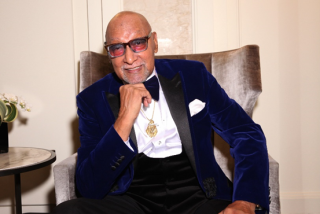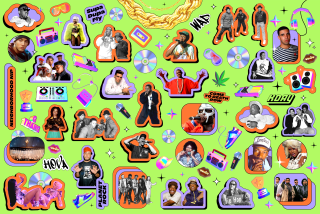Maytals Find Good Vibes in the Memphis Roots of Reggae
- Share via
“Reggae Got Soul” was the title of a 1976 album by Toots & the Maytals, and Frederick (Toots) Hibbert reemphasized that connection last year by recording an album of Memphis soul songs.
“Toots in Memphis,” Hibbert’s first album in six years, has garnered a Grammy nomination for best reggae album and rekindled interest in the career of the veteran Jamaican vocalist, who appears tonight at the Coach House and Thursday at the Palace.
“For a very long time, I have not gotten such a good vibe worldwide about myself and reggae music like what I’m getting now,” said Hibbert, battling a cold during a recent phone interview from Atlanta. “I used to love those songs. All I needed was somebody to tell me to do them.”
The catalysts were Island Records executives Jerry Rapaport and Chris Blackwell, who conceived the idea and also made some suggestions regarding the songs. The material includes familiar hits by Eddie Floyd (“Knock on Wood”), Al Green (“Love and Happiness”) and Ann Peebles (“Love the Rain,” a reworking of her “I Can’t Stand the Rain”).
The album could have been a stale run-through of moldy oldies, but Hibbert’s reggae-tinged arrangements twisted the songs without sacrificing their soulful directness. The vitality of the instrumental performances--the backing tracks and vocals were recorded live in just three days--clearly inspired Hibbert’s gritty, rough singing.
“Toots in Memphis” was a natural step for Hibbert. He was frequently compared to soul men like Redding when Toots & the Maytals appeared on the international scene in the mid-’70s. And like many Southern soul singers, he began his career by singing in a Baptist church before entering the pop music world.
“My influences when I was coming up in the business were Ray Charles, Sam Cooke, Jackie Wilson and Otis Redding,” Hibbert said. “I’d heard them on the radio in Jamaica and fell in love with the voices in the songs. I started to sing and people would tell me I would sound like Ray Charles or Otis Redding, so I figured these guys are my brothers.”
Hibbert joined forces with harmony vocalists Jerry Matthias and Raleigh Gordon in 1962 and the vocal trio recorded its first single (as the Vikings) the next year. The group, which soon changed its name to the Maytals, became such a popular attraction in Jamaica during the mid-’60s ska era that it shared concert bills with such American artists as Charles and Redding.
With two songs featured on the breakthrough “The Harder They Come” sound-track album in 1972 and its energetic, soul-style stage performances, Toots & the Maytals were widely pegged as the Jamaican group that would bring reggae to a wider audience. But reggae soon became identified with the Rasta rebel stance epitomized by Bob Marley, and Toots & the Maytals’ albums were increasingly marred by weak material. After the “Knockout” album in 1982, Hibbert took a break from the music world.
“After the deaths of . . . Bob Marley and Peter Tosh, I figured I should eat other seeds,” Hibbert reflected. “I stopped singing for a long while, and was just writing songs and teaching the youths. The youth of today need to know how to go towards music, not to use cocaine or any dope, just put your mind to what you have to do to live a clean life.”
But Hibbert is back again, and with reggae’s growing commercial profile and what seems to be a creative resurgence in the genre, he’s optimistic about the future.
“It’s like a rebirth for me,” Hibbert declared. “What I really saw then (when reggae first became prominent), I feel again.”
“We didn’t use to get a lot of encouragement where money is concerned. When we started into it then, we would only get 5, 10, maybe up to 30 or 40 for a good record that was No. 1 in Jamaica.
“We just shared it so everybody could get a little bit. Now we can get much more, so it’s like I just started now.”
More to Read
The biggest entertainment stories
Get our big stories about Hollywood, film, television, music, arts, culture and more right in your inbox as soon as they publish.
You may occasionally receive promotional content from the Los Angeles Times.










